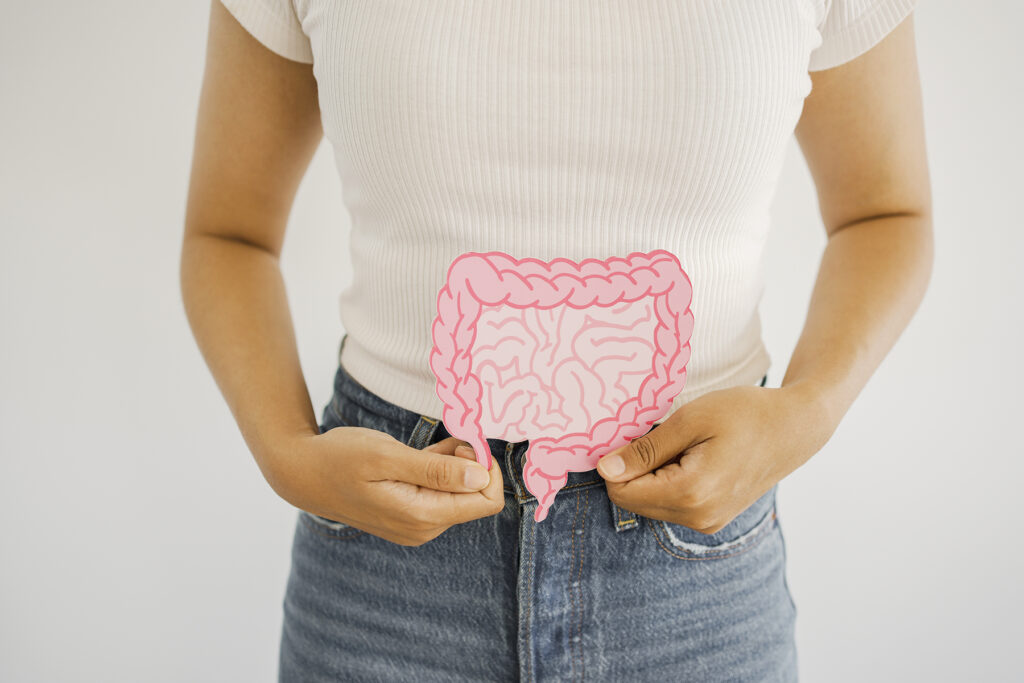Diet and Colorectal Cancer Prevention: Foods That Help Lower Your Risk
Colorectal cancer is one of the most prevalent cancers in Canada.1 The good news is that healthy food choices and habits can help lower your risk of getting this common cancer.

On this Page
What is colorectal cancer?
Colorectal cancer, sometimes also called colon cancer, refers to two types of similar cancers:
- Cancer of the colon, which is the large intestine or bowel
- Cancer of the rectum, which is the end portion of the large intestine
What are the risk factors for colorectal cancer?
The risk factors for colorectal cancer include both factors you can’t change (like genetics) and factors that you can change (like eating habits).2,3
Factors you can’t change:
- A family or personal history of colorectal cancer
- Presence of non-cancerous (benign) polyps
- Inflammatory bowel disease like ulcerative colitis or Crohn’s disease
- Being over the age of 50
Factors you can change:
- Smoking
- Drinking too much alcohol
- Lack of exercise and physical activity
- Eating a diet that is low in fibre
- Eating a diet that is high in red meat and processed meats
- Being overweight or obese
What food choices can you make to help prevent colorectal cancer?
Some 70% of cancers in the digestive system are related to eating habits.4 This means that you can start today to lower your risk of colorectal cancer with simple changes to your everyday food choices. The World Cancer Research Fund recommends the following food choices as part of colorectal cancer prevention:5
- Eat more whole grains and other foods high in fibre6
- Choose whole grains foods more often. A whole grain includes all the fibre and nutrient filled parts of the grain. When looking at an ingredient list, keep an eye out for the words ‘whole grain’. Some examples of whole grains include brown rice, barley, oats, rye and quinoa.
- Eat a variety of high fibre foods each day. In addition to reducing your risk of colorectal cancer, fibre helps keep your blood sugar and heart healthy and keeps you feeling full and regular. In addition to whole grains, high fibre foods include vegetables, fruit, nuts, seeds, beans, lentils and peas. Click here to learn more on fibre.
Tip: If you’re new to eating high fibre foods, slowly increase the amount you eat to prevent gas and bloating. Drinking plenty of fluids and staying active will also help. Click here to learn more on fibre.
- Consume more dairy products
Research clearly indicates that eating dairy products may help decrease the risk of colorectal cancer.5 Studies demonstrate that the naturally-occuring calcium in milk is strongly linked to dairy’s protective effect.7 And other nutrients in dairy may also play a role in lowering your colorectal cancer risk. Aim to eat dairy products regularly, along with vegetables, fruit, whole grains and other protein foods, to help reduce your risk of colorectal cancer.8
- Limit red meat and avoid or consume as little processed meats as possible
Limit red meat, like beef, pork, veal and lamb, to twice a week all while aiming for portion sizes roughly equal to the size of the palm of your hand.9 As for processed meats, like bacon, hot dogs and cold cuts, it is best to avoid or consume as little of them as possible.10
Other changes that you can make that are also part of the prevention picture:11,12
- Eat more non-starchy vegetables. Cruciferous vegetables, like cauliflower, broccoli, cabbage and radish, have been shown to protect against colorectal cancer.
- Eat more fruit and more foods with vitamin C. Low fruit intake may increase the risk of colorectal cancer.
- Reduce your alcohol consumption. Two or more drinks per day increases your risk of colorectal cancer so try to limit your alcohol intake.
- Get more physical activity in your daily routine. Aim for 30 minutes each day of moderate to vigorous physical activity.
- Quit smoking. Smoking increases your risk of many cancers, including colorectal.
- Maintain a healthy body weight. Being overweight or obese increases your risk of developing colorectal cancer.
New recipes to try
If you’re looking to add some new meals to the mix, try these recipes with fibre, calcium, whole grains and more – and know that you are taking healthy steps to prevent colorectal cancer.
- Yes, soup can have both fibre and calcium! Treat your tastebuds to a delicious bowl of creamy enchilada soup or oven-roasted cauliflower soup.
- If you’re looking for a leisurely cooking project – that provides fibre, calcium and protein – try this vegetable packed lasagna with ratatouille sauce.
- End your day with a soothing peppermint vanilla tea latte or a slice of dark chocolate and cherry bread pudding.
The “bottom” line
- Choose whole grains over non-whole grains
- Try to eat a variety of high fibre foods like beans, lentils, nuts, seeds, fruit and vegetables each day
- Consume dairy products like milk, cheese and yogurt regularly
- Limit red meat to two times or less a week
- Avoid processed meats as much as possible
- Enjoy non-starchy vegetables and fruit often
- Aim to be physically active for 30 minutes each day
- Limit your drinking to 2 drinks or less a day
- If you smoke, try to quit
And don’t forget, screening is an important part of prevention! When colorectal cancer is caught early it can be treated. In Canada, colorectal cancer screening usually starts at the age of 50. Make sure to talk to your doctor about when you should start screening based on your family history and lifestyle.
References
- Colorectal Cancer Canada. 2024. Colorectal Cancer Screening. www.colorectalcancercanada.com. Accessed January 31, 2025.
- Colorectal Cancer Canada. 2024. Colorectal Cancer Risk Factors. www.colorectalcancercanada.com. Accessed January 31, 2025.
- Colorectal Cancer Canada. 2024. Prevention Overview. www.colorectalcancercanada.com. Accessed January 31, 2025.
- Foods That Fight Cancer. 2024. Food and Cancer Prevention. www.foodsthatfightcancer.ca. Accessed February 1, 2025.
- World Cancer Research Fund/American Institute for Cancer Research. Diet, nutrition, physical activity and colorectal cancer: A Global Perspective, Continuous Update Project Expert Report 2018. Available at dietandcancerreport.org. Accessed February 12, 2025.
- World Cancer Research Fund/American Institute for Cancer Research. Diet, nutrition, physical activity and colorectal cancer: A Global Perspective, Continuous Update Project Expert Report 2018. Available at dietandcancerreport.org. Accessed February 12, 2025.
- Papier, K. et al. Diet-wide analyses for risk of colorectal cancer: prospective study of 12,251 incident cases among 542,778 women in the UK. Nat Commun 2025;16:375.
- World Cancer Research Fund/American Institute for Cancer Research. Continuous Update Project Expert Report 2018. Diet, nutrition, physical activity and colorectal cancer. Washington, DC: AICR. 2018.
- Foods That Fight Cancer. 2024. Reduce Red Meat. www.foodsthatfightcancer.ca. Accessed February 1, 2025.
- Foods That Fight Cancer. 2024. Reduce Red Meat. www.foodsthatfightcancer.ca. Accessed February 1, 2025.
- Colorectal Cancer Canada. 2024. Prevention Overview. www.colorectalcancercanada.com. Accessed January 31, 2025.
- Foods That Fight Cancer. 2024. Eat Vegetables and Whole Grains. www.foodsthatfightcancer.ca. Accessed February 1, 2025.
Other articles

Protein for Your Fitness and Health

Milk Products: Your Partner in Healthy Eating
